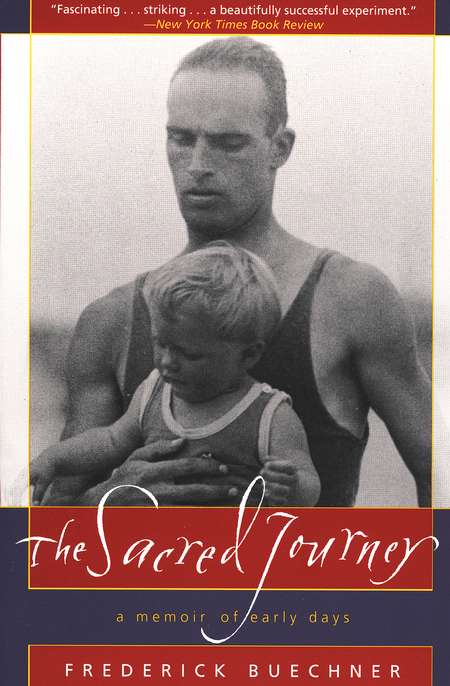Note: this blog post touches on the topic of suicide.
They say God speaks in our lives, in both the beauty and the brokenness, but what meaningful pattern are we supposed to find in this incomprehensible world? God speaks in our lives, but even if we strain towards his voice, can we ever fully trust that we understand what we hear in the midst of the noise?
Deaths and griefs are like thumbprints, as unalike as the lives and souls and relationships of the people lost and the people left behind. I started reading Frederick Buechner’s books because a friend told me that the author and I had something in common: both our fathers committed suicide when we were young. Reading The Sacred Journey left me clanging like a bell:
“[God speaks] through events in all their complexity and variety, through the harmonies and disharmonies and counterpoint of all that happens. As to the meaning of what he says, there are times that we are apt to think we know. Adolph Hitler dies a suicide in his bunker with the Third Reich going up in flames all around him, and what God is saying about the wages of sin seems clear enough…
But what is God saying through a good man’s suicide?”
—
When my father died, a friend assured me that someday I would look back and know why God had willed his death. I thanked her politely and through gritted teeth. In that moment, I didn’t particularly want the world to make sense. There was no comfort in the idea that my father’s pain and passing served a greater purpose, because what could be worth that sacrifice? If God did exist, surely one good man’s suicide could never be part of his plan. A pointless, random world – something like Kurt Vonnegut’s cheerful version of nihilism – made more sense than divinely ordained suffering.
“Hello, babies. Welcome to Earth. It’s hot in the summer and cold in the winter. It’s round and wet and crowded. At the outside, babies, you’ve got about a hundred years here. There’s only one rule that I know of, babies — ‘God damn it, you’ve got to be kind.’”
-Kurt Vonnegut, God Bless You, Mr. Rosewater

I now worship in a tradition whose saints and leaders tend to describe the bulk of human life as suffering, albeit suffering with a purpose—we take up our crosses like Christ, and we engage soberly in confession, prayer, and acts of love and self-denial along the way. One friend, who has been dealt about a thousand hard knocks throughout her life and somehow born it with the grave sweetness associated with the word “long-suffering,” once told me frankly that she would have killed herself long ago if it weren’t for her belief in some underlying purpose to her pain – or at least, in the presence of opportunities for holiness, embedded mysteriously within each trial. Personally I’m not so sure, and I still tend to relapse into a Vonnegutian worldview that meets the horrible wonderfulness of human life with a perky “Why not?” and a shrug. At the very least, it helps to try to see God’s spirit at work, mysteriously speaking through joy and pain and bringing all these crazy things together for good, healing and guiding us broken, self-harming humans in spite of ourselves.
Buechner’s “alphabet of grace,” as he describes it in The Sacred Journey, is one way of viewing that mystery:
“Life itself can be thought of as an alphabet by which God graciously makes known his presence and purpose and power among us. Like the Hebrew alphabet, the alphabet of grace has no vowels, and in that sense his words to us are always veiled, subtle, cryptic, so that it is left to us to delve their meaning, to fill in the vowels, for ourselves, by means of all the faith and imagination we can muster. God speaks to us in such a way, presumably, not because he chooses to be obscure but because, unlike a dictionary word whose meaning is fixed, the meaning of an incarnate word is the meaning it has for the one it is spoken to, the meaning that becomes clear and effective in our lives only when we ferret it out for ourselves.”
—
Of course nothing really justifies or fixes the truly horrible things that happen in this world. God’s presence, apparently, doesn’t bring back our loved ones who despaired, or turn back the clock on a natural disaster or CPS case. Angela Gorrell, author of The Gravity of Joy and instructor for Following Jesus to Purpose and Meaning, has this to say about searching for meaning in the midst of pain:
“You don’t have to justify what has happened… or find meaning in it. We don’t have to say, ‘God doesn’t give us more than we can handle,’ or ‘Everything happens for a reason,’ in order to make pain productive… we can say, ‘I don’t know why this happened. But… I’m going to find ways to do meaningful work in the world, in light of what I’ve experienced.’”
We are all just trying to do our own meaningful work in a sometimes-senseless world. And however legitimate and inescapable our existential questions may be in light of that senselessness, we may find the task minutely easier to manage after we quit doomscrolling, grab a coffee with a genuine friend, avoid books with sad endings for a while, and maybe spend some time bathing in sunshine and birdsong. These activities aren’t cures, but they’re the most helpful I’ve found so far for enabling me, even just for the briefest, glimmering moment, to put my finger on life’s alphabet of grace.
May those glimmering moments fuel us in our pursuit of that most meaningful work – what Buechner calls, near the end of The Sacred Journey, “journeying for the world’s sake”:
“True peace, the… peace that passeth all understanding, is to be had not in retreat from the battle, but [it is] only … by journeying for the world’s sake—even when the world bores and sickens and scares you half to death—that little by little we start to come alive.”



